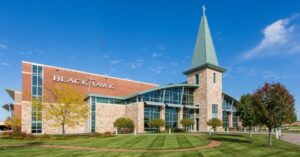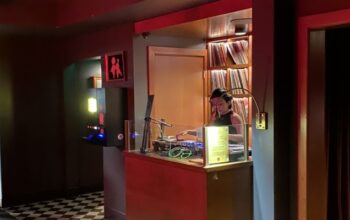On a Sunday morning at Blackhawk Church in Middleton, voices rise in unison — some in English, some in Spanish.
Hands lift, eyes close.
For worship leader Mariah Calubag, these moments are more than routine. They're deeply personal.
“I feel the most close to God when I’m worshipping him,” she said. “That’s when I’m the most vulnerable.”
At Blackhawk Church, worship isn’t just about music. It’s about presence — with God and with each other. Whether expressed through gospel harmonies, quiet lament or multilingual praise, worship at Blackhawk is a mosaic of cultures, convictions and community. Volunteers, pastors and students from across backgrounds come together to create a space where people can feel seen, known and welcomed — no matter where they come from.
Worship as encounter
For many in Blackhawk’s worship community, the act of worship is where faith becomes real — a moment of honest connection with God.
“Worship is the conduit through which many of us experience God,” said Pastor Colier McNair, who leads the Gospel Fusion venue and has written original songs for the church. “It softens the heart, prepares you for what God might say. It brings conviction, authority and passion.”
Calubag, who is finishing her doctoral degree in cellular and molecular biology at UW–Madison, said worship was how she found faith in the first place. “Hearing worship songs is what got me curious about Jesus,” she said. “You never know who’s in the room, who’s listening.”
Leyri Thais, a UW student and worship vocalist, described it simply:“Anyone can sing on stage. But not everyone worships. Worship comes from the heart.”
Cultural expression, spiritual unity
Blackhawk’s commitment to multicultural worship is intentional. With both Chinese-speaking and Spanish-speaking ministries and services offered at both the church’s Downtown and Middleton locations, the church reflects a diversity rarely seen in traditional worship spaces.
“Multicultural worship is one of our distinctives,” said Pastor Michael Knapstad, who oversees college ministry and internships. “We want people to feel they can worship God in the way that feels culturally natural to them.”
Still, bringing different styles and traditions together comes with challenges.
“At my home church, people raise their hands, cry and dance in the Spirit,” said Thais, who is Puerto Rican. “Here, people tend to be still. At first, I got self-conscious seeing that — like, am I doing too much?”
For Knapstad, who grew up in a Midwestern family, these moments of cultural stretching have been powerful.
“When a Spanish-speaking intern sang a verse in her language, I didn’t fully understand — but I felt invited into something beautiful,” he said. “It reminded me that others might not always feel comfortable in the worship I’m used to. And that’s humbling.”
Behind the music
Blackhawk’s worship teams are mostly made up of volunteers — musicians, students, staff and community members who rehearse weekly. Worship leaders help design music sets, choose songs based on who’s available and adapt worship to the theme of the week.
Calubag said the most challenging part isn’t the music itself — it’s the leadership that comes with it. “I had to learn to pray out loud, welcome the congregation. That was hard for me at first,” she said. “But it helped me grow.”
McNair, who has written a song called “Known by God” among hymns, shared that his songwriting process often begins with a title or a phrase he hears in life or in church.
“I’m project-oriented,” he said. “Once I have a title, I meditate on it. What’s the message? What is God saying? Then I build the song.”
He also emphasized the importance of collaboration. “I used to do all the parts myself — drums, strings, piano. Now I try not to. Involving others makes the music richer. It reflects the body of Christ.”

Creating space for God to move
For all four leaders, worship isn’t just performance — it’s spiritual leadership.
“You should have a prayer life if you want to lead worship,” McNair said. “It’s a privilege, not a right. And if you’re not aligned with God, people can feel that.”
Thais said personal time with God — even casual, internal conversations throughout the day — helps her stay grounded. One of her most powerful worship moments happened not in church, but in her dorm room.
“I was just on my bed listening to music, then ended up on my knees, crying, worshipping. The Holy Spirit was there,” she said. “That showed me I don’t need a stage. I just need to make space.”
Calubag had a similar moment at Blackhawk’s Blue Christmas service, where a worship leader sang a song called “I’ll Seek You, Lord.”
“I had just lost my dad. I was doubting, hurting,” she said. “And that song reminded me: God is still worth seeking.”
Knapstad put it this way:“We all worship something — a team, a person, a goal. For us, it’s God. Worship is about saying: You’re bigger than me. And I trust You.”
Worship that reflects heaven
Blackhawk’s worship leaders know that their work won’t always please everyone. Cultural differences remain. Musical preferences vary. But the vision is bigger than a single style.
“Maybe this Sunday isn’t your favorite song,” McNair said. “But maybe it is for someone else. That’s spiritual maturity — celebrating what brings someone else joy.”
“The Bible says every tribe, tongue and nation will worship God in heaven,” Knapstad added. “We’re just trying to reflect that now.”
And for those who walk into church uncertain, skeptical or hurting, the hope is simple:
“That they would feel God’s presence,” Calubag said. “That worship wouldn’t just sound beautiful — it would mean something.”






